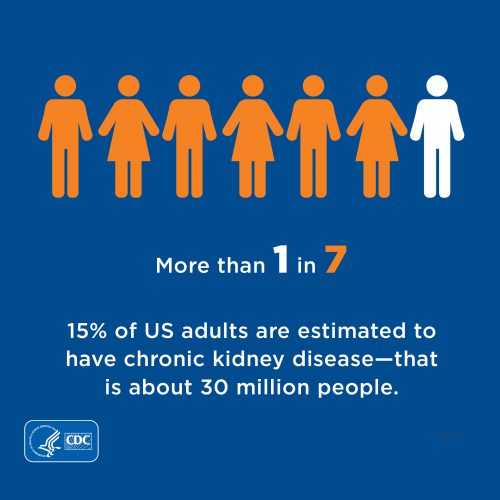National Chronic Kidney Disease Fact Sheet

Chronic kidney disease (CKD) is a condition in which the kidneys are damaged or cannot filter blood as well as healthy kidneys. Because of this, excess fluid and waste from the blood remain in the body and may cause other health problems. CKD is common among adults in the United States. The 2017 National Chronic Kidney Disease Fact Sheet is intended to provide the latest national estimates and general information regarding CKD in the United States [PDF – 1 MB].
Fast Facts
- 30 million people or 15% of US adults are estimated to have CKD.
- 48% of those with severely reduced kidney function but not on dialysis are not aware of having CKD.
- Most (96%) people with kidney damage or mildly reduced kidney function are not aware of having CKD.

Read the 2017 National Chronic Kidney Disease Fact Sheet [PDF – 1 MB] to find more facts, including information about the risk factors for developing CKD, symptoms, testing, and treatment, and other diseases caused by CKD.
Related Information
Take Care of Your Kidneys and They Will Take Care of You [PDF – 281 KB]
Diabetes can cause kidney disease. The good news is that there is a lot you can do to prevent kidney problems, including keeping your blood sugar and blood pressure under control.
CKD Info Cards
Info cards for sharing in social media.
Chronic Kidney Disease Initiative Website
CDC’s CKD Initiative tracks the burden of CKD in the United States and works to raise awareness, to promote early diagnosis, and to improve outcomes and quality of life for those living with CKD.
- Page last reviewed: July 6, 2017
- Page last updated: July 6, 2017
- Content source:
- Maintained By:
- National Center for Chronic Disease Prevention and Health Promotion, Division of Diabetes Translation


 ShareCompartir
ShareCompartir